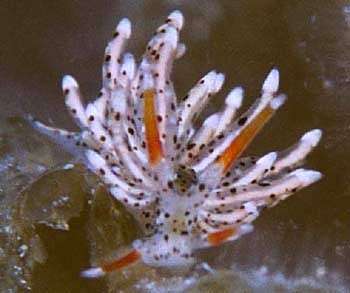
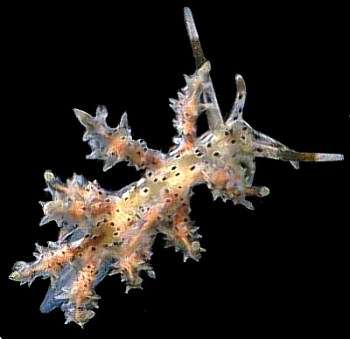
Eubranchopsis virginalis
Baba, 1949
Order: NUDIBRANCHIA
Suborder: AEOLIDINA
Family: Eubranchidae
DISTRIBUTION
Japan
PHOTO
UPPER: Kushimoto, Japan. 7mm long, Depth: 1m, Crawling sea weed, 12 March 2000. PHOTO: Yasuhiro Shirai.
LOWER: Kominato, Boso Peninsula, Japan. Intertidal, on Sargassum, BL 7 mm, December 1996. PHOTO: Yoshi Hirano
Eubranchopsis virginalis is characterised by the large black spots scattered over the body, cerata and tentacles. The spots often have traces of a whitish ring around them. The cerata have the typical swollen eubranchid cerata and often have pointed papillae. The anterior foot corners are extended into slender tentacles.
See Yasuhiro Shirai's and Yoshi Hirano's messages below.
References:
• Abe, T. (1964) Opisthobranchia of Toyama Bay and adjacent waters.
Hokuryan-Kan: Tokyo. 100pp, Pls 1-36.
• Baba, K. (1949) Opisthobranchia of Sagami Bay Iwanami Shoten: Tokyo.
• Baba, K. (1971) Supplementary note on the anatomy of Eubranchus virginalis (Baba, 1949) from Japan (Nudibranchia: Eolidoidea: Eubranchidae). Publications of the Seto Marine Biological Laboratory, 19(1): 39-42.
Rudman, W.B., 2000 (April 12) Eubranchopsis virginalis Baba, 1949. [In] Sea Slug Forum. Australian Museum, Sydney. Available from http://www.seaslugforum.net/find/eubrvirg
Related messages
Re: Eubranchopsis virginalis ? from Ratnagiri, In
May 15, 2009
From: vishalbhave
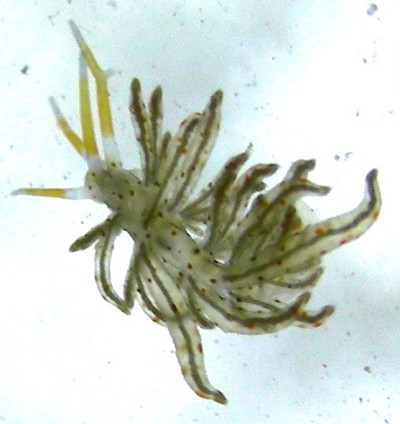
Concerning message #2258:
This slug,Eubranchopsis virginalis, may have come into my experimental marine tank with alga or rocks.
The image is captured with normal digital camera (Nikon coolpix S4) with a 20X optical lens of microscope in front of it.
Locality: Rocky patch, Mandvi, Ratnagiri, , 1 feet, Maharashtra, India, Arabian sea, 15 February 2009, intertidal, rocky, with lots of sponges, hydroids, bryozoans and alga. Length: 1 mm. Photographer: Vishal Bhave.
Vishal Bhave
vishalbhave@gmail.com
Bhave,V.J., 2009 (May 15) Re: Eubranchopsis virginalis ? from Ratnagiri, In. [Message in] Sea Slug Forum. Australian Museum, Sydney. Available from http://www.seaslugforum.net/find/22460Dear Vishal,
This is another interesting find from India - and another problematic eubranchid aeolid. This is most probably the same species as Yasuhiro Shirai's animal from Japan [message #2258] which I have tentatively identified as Eubranchopsis virginalis,but one distinctive feature of that species is the long, almost tentacular, tubercles it has on its cerata, as is well illustrated in Yoshi Hirano's message [#2268].
Until someone compares the anatomy of these two forms I have considerable misgivings about identifying your animal as E. virginalis. Interestingly, in Rao's paper describing Eubranchus mandapamensis, he also describes another species of Eubranchopsis from India - E. indicus. It has the tentacular tubercles on the cerata but lacks any distinct colour pattern or spots. As the largest of his 7 specimens was less than 6 mm long, its possible he was dealing with juveniles of 'true' E. virginalis. I guess this is just another taxonomic puzzle we have yet to resolve.
Best wishes,
Bill Rudman
Re: Cerata of Eubranchopsis virginalis
April 14, 2000
From: Yoshi Hirano
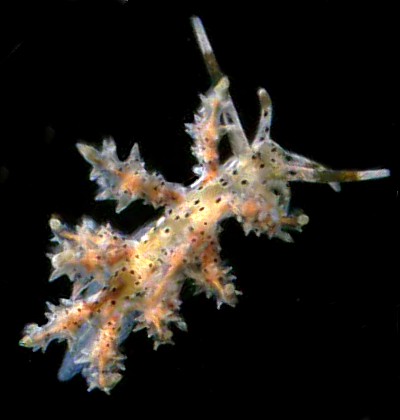
Dear Bill,
I would like to show my photo of Eubranchopsis virginalis as an example of a specimen with 'acutely pointed tubercles' on the cerata. I agree with your comment that the outline of aeolid cerata may alter depending on individuals or condition of the animal.
Data: Kominato, Boso Peninsula, Japan
Intertidal, on Sargassum, BL 7 mm, 11 Dec. 1996.
Best wishes,
Yoshi Hirano
hiranoyj@earth2.s.chiba-u.ac.jp
Hirano, Y., 2000 (Apr 14) Re: Cerata of Eubranchopsis virginalis. [Message in] Sea Slug Forum. Australian Museum, Sydney. Available from http://www.seaslugforum.net/find/2268Thanks Yoshi,
Your photo looks very like the painting in Opisthobranchs of Sagami Bay. Yasuhiro's animal seems to be a peculiar colour form with more white pigmentation and redder bands on the oral tentacles and rhinophores.
Best wishes,
Bill Rudman.
Eubranchopsis virginalis from Japan
April 12, 2000
From: Yasuhiro Shirai
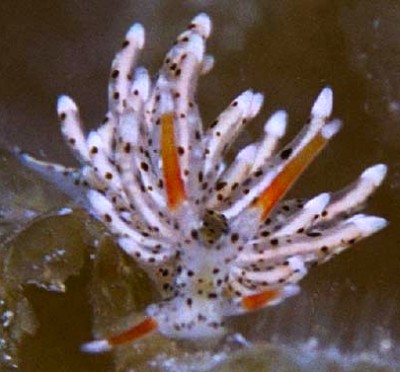
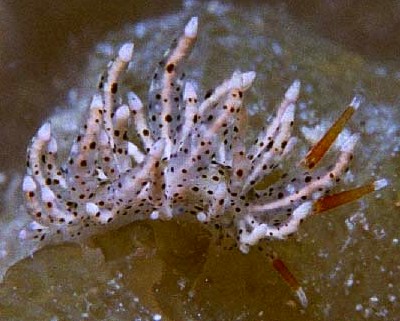
Dear Bill,
I attached 2 image files in this mail.
This animal have black spots on its body and cerata.
Could you please identify this animal for me?
Data:
Location: Kushimoto Japan
Length: 7mm
Water temperature: 15C
Date 12 March 2000
Depth: -1m
Crawling sea weed.
Best regards,
Yasuhiro Shirai
yasuhiro@e-net.or.jp
Shirai, Y., 2000 (Apr 12) Eubranchopsis virginalis from Japan. [Message in] Sea Slug Forum. Australian Museum, Sydney. Available from http://www.seaslugforum.net/find/2258Dear Yasuhiro,
I am pretty sure this is Eubranchopis virginalis Baba, 1949. Baba (1949, 1971) does not mention the orange bands on the rhinophores and oral tentacles, but Abe (1964) shows dark bands in his black & white illustration, which probably represent these bands. As soon as I saw your photo I thought of the painting in Baba's Opisthobranchs of Sagami Bay (1949).
What is not clear in your photos are the 'acutely pointed tubercles' which are reported by Baba and Abe to occur on the cerata, but in other eubranchids such tubercles are sometimes very obvious and sometimes almost invisible. Certainly the shape of the cerata as you can see in the lower photo have the characteristic eubranchid shape gradually increasing in diameter from the base to about halfway along its length and then sharply decreasing in diameter to form a long tapering upper third.
This is a very interesting find. I don't know of a reference to this animal outside the references I list below.
Best wishes,
Bill Rudman.
•Abe, T. (1964) Opisthobranchia of Toyama Bay and adjacent waters.
Hokuryan-Kan: Tokyo. 100pp, Pls 1-36.
•Baba, K. (1949) Opisthobranchia of Sagami Bay Iwanami Shoten: Tokyo.
•Baba, K. (1971) Supplementary note on the anatomy of Eubranchus virginalis (Baba, 1949) from Japan (Nudibranchia: Eolidoidea: Eubranchidae). Publications of the Seto Marine Biological Laboratory, 19(1): 39-42.
